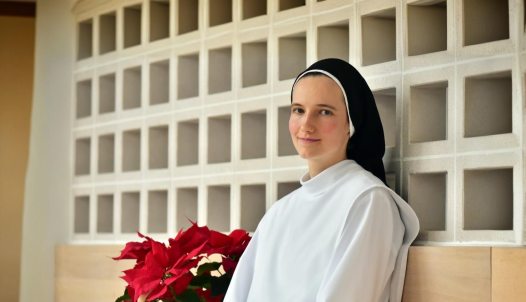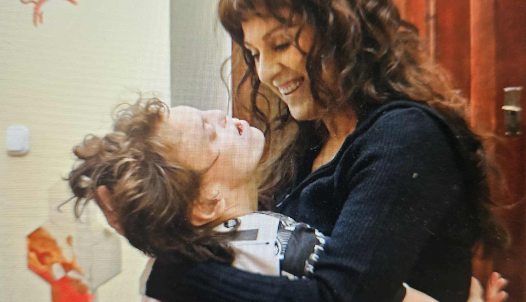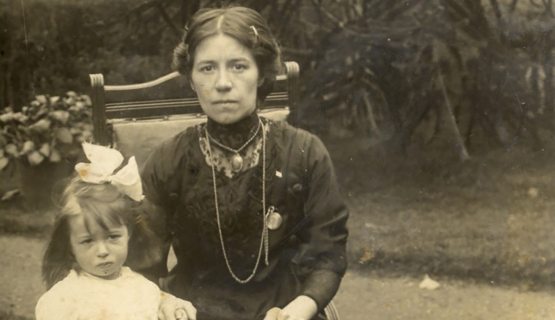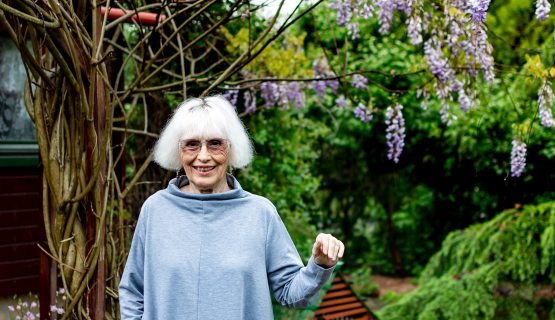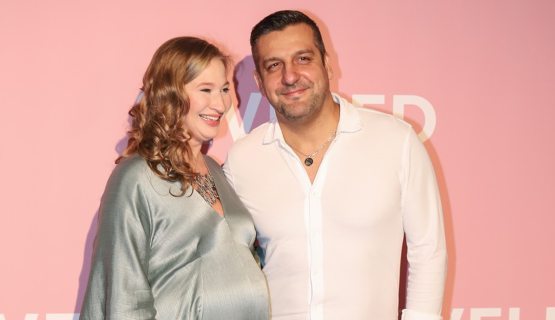“I realized we must first live through the wilderness before we are given a mission”
The homeless are her friends, and inmates are her students. Anikó Mihályi, former Hungarian literature teacher at the Budai Cistercian St. Imre High School, burned every bridge behind her four years ago. She felt that simply a rewarding career was not enough — she had a duty to do something for others. She sought God’s will regarding her next step, and found her place — as a teacher — in prison.
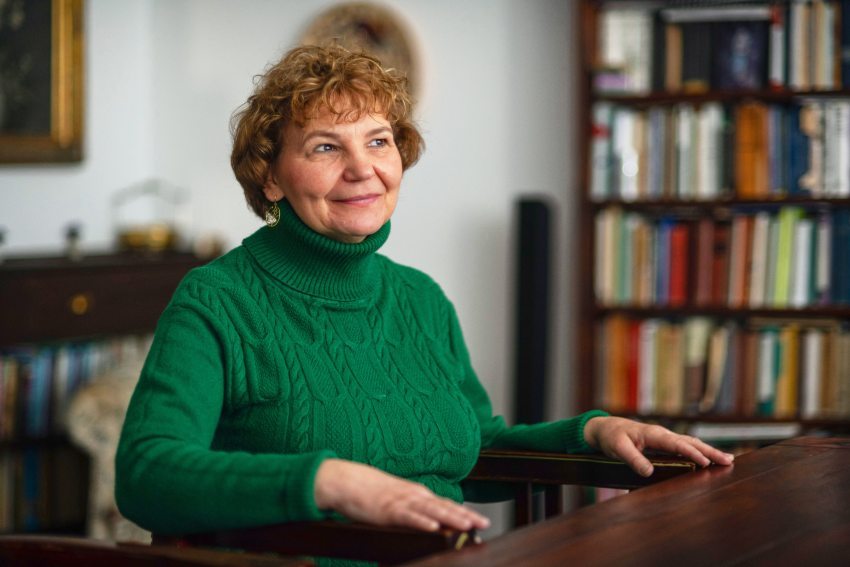
Where does your social sensitivity and compassion for the people living on the periphery come from?
My father was a general practitioner in the countryside, and my mother worked alongside him as an assistant. The family home was connected to the doctor’s office, and anyone could come in at any time — the door was always open. At Christmas and Easter my mother prepared packages, and my siblings and I delivered them to the poor.
Whenever someone rang the bell to ask my father for money or help, he never turned them away.
This kind of sensitivity is my parents’ legacy. For more than ten years, every Wednesday I’ve visited my homeless friends with the Community of Sant’Egidio. That’s where I understood that this is not just a feeling, but a commitment to those living on the periphery of society. This experience taught me how little is needed to be happy.
Did these encounters spark a desire to seek out others with similarly difficult lives?
I had no such desire. I thought I would live my life teaching at the Budai Cistercian St. Imre High School and visiting my homeless friends — but I felt more and more that I wasn’t in the right place.
An elite high school, with all its challenges, can be an inexhaustible source of success. What was missing?
To this day I’m grateful, because I had very talented students who won national competitions. I can’t say I had an unsuccessful career. I remember that the annual performance review always included the question: “What are you proud of?” I regularly wrote that I wasn’t proud — I was grateful. It was among my homeless friends that I realized how grateful I could be for my family and my students. That gratitude unconsciously brought out a sense of obligation in me: I couldn’t just swim in satisfaction or bask in glory — I had to do something.
During silent contemplative retreats in the summer, I kept asking the Lord to show me where I belonged. Four years ago, I realized we must first live through the wilderness before we are given a mission, and so I left St. Imre.
I kept nothing from my past; I burned every bridge behind me. I wept, because I had to grieve the twenty-seven years I had spent at the school — and in that letting go, I heard where I needed to go.
I began teaching in prison, and only then did I realize that when I was seventeen or eighteen, searching for my path, I opened the Scriptures to the passage where Jesus reads in the synagogue: “The Spirit of the Lord is upon me, because he has anointed me to bring good news to the poor; he has sent me to proclaim liberty to the captives.” For decades I interpreted it symbolically and prayed for people living with addiction — I never imagined I would actually teach inside a prison one day.
How did your family react to you leaving a secure job?
They just stared, wondering what was happening. I can’t say they were thrilled — one of my sons in particular was very frightened. They were worried, yet they supported me and trusted me.
Weren’t you afraid to walk through the prison gates alone?
From the moment I felt the calling, a deep certainty and sense of safety settled in my heart. It never even occurred to me to be afraid. I remember the excitement lasted only a few minutes on the first day, and from then on I felt I was exactly where I belonged.
What is worth teaching to inmates?
From the very first moment I sensed that my role was not primarily to transmit knowledge. When I prepare for a class, I try to find the “heart” of the text. With my sixth-graders we are reading Toldi now. It is beautiful how Miklós experiences being lost, stuck and without a home in the reed-bed. These emotions are something inmates can deeply relate to.
When I teach the Baroque period, I focus on the struggle between good and evil, and I bring them Géza Röhrig’s poem Stereo, in which the devil and the angel whisper in one’s ear. They also like to articulate their inner battles, which makes the literary works personal.
I imagine the environment and resources are much poorer than in a high school in Buda…
I gathered textbooks from different schools. And I have what I bring with me: my experience, my knowledge, my ability to tune into them. I often sing or recite poems for them. Many of them are transferred to another prison during the year, or arrive in the middle of the term, so I never know how many hours they will have with me — which makes every single class important. I try to make them feel their humanity and dignity here and now.
You approach them with trust and understanding. Are they able to treat each other the same way?
This is an exciting question, because my goal for them is not just to open up, but to pay attention to one another. I studied nonviolent communication and still teach it today, inside the prison as well. They live in different cells, so they don’t know each other. It takes a few months until they can connect at some level. It’s not about sharing life stories, but expressing opinions.
How manageable are these adult men? Do they show respect?
They sense that I treat them with full respect and address them with human dignity — and I receive the same in return. I have never once experienced disrespect.
I currently teach in Kozma Street Prison, where twenty men can fit into the classroom, but in Vác there were forty men sitting in front of me — which is quite a challenge as the only woman present. Still, the atmosphere of trust was so strong that I was never afraid, not even for a moment.
If someone crosses a line, the others warn him. Discipline is mostly needed when inmates who know each other end up in the same class and want to chat. Then I tell them to stop — or sometimes I give them five minutes to talk, and we continue afterwards.
What consequences can follow misbehavior?
If I had serious problems with someone, he would be banned from studying and lose the monthly 20,000 forints he receives for attending classes. The stakes are high, but it has never come to that. A single sentence is enough — they apologize immediately if they’ve crossed a boundary.
Do the circumstances allow for personal, one-on-one conversations?
If something is weighing on them, I listen and respond briefly. They tell me things like: “Ma’am, I can’t concentrate today — I have serious problems at home,” or that a close family member died. But long personal conversations — pastoral or educational in nature — aren’t possible, because they are escorted back to their cells right after class.
It must be difficult to balance empathy with not carrying their burdens yourself.
Serving the homeless was an important school for me in this regard — every week we face the fact that we cannot “save” them. But in the moment of the encounter, I can give attention and love. I experience the same in prison. Yes, I have cried, because I was deeply touched by someone’s story. One inmate lost his ten-year-old child during COVID. I was teaching the Bible, and he asked how he could trust God after that. The following Sunday at Mass we received a leaflet about spiritual adoption. It passed through my mind to take it to the prison. Before class, while the others were gathering, I gave it to him and said: prayer has helped me a lot — try it, maybe it will help you too.
Two or three weeks later he thanked me, saying that his heart felt lighter. He told me he plugs his ears at night so outside noise won’t disturb him, and he prays.
At the high school it already became clear to me — and I believe it now even more — that I want to love my students toward God. Every day I spend two and a half hours commuting, and during that time I pray for them. I’m not the one carrying their burdens — in prayer I place them before God. I have been a member of the Verbum Dei Missionary Family for twenty years; they also pray for me and for the inmates. That means a lot.
How do you unwind from the emotional load of the work?
I usually say: my work is my hobby. In addition to the prison, I have other jobs that I also experience as hobbies. I edit and host two programs at Magyar Katolikus Rádió, I conduct cultural interviews for Bartók Rádió, and starting in January I will write about my prison experiences for the Szemlélek blog. I also teach literature in the art-therapy program at the Sapientia University. Besides that, I go to theatre and movies, hike, and spend a lot of time with my family.
If you could go back in time, would you choose the same path?
Our vocation is to let God shape us into His image. In this shared vocation, I was given the talent to be a teacher — a great gift for me. I would choose the same again. Certainly, there are moments I’d evaluate differently today, but I can accept the decisions I made.
So you’re satisfied with your life?
I would rather say that I am a happy person. Happiness for me is not a life goal — it is a gift. I am grateful because I have received everything I considered important, and even things I never dared to formulate as desires.
This interview originally appeared in the April 2025 issue of Képmás magazine.
The English translation was produced with artificial intelligence and reviewed by a human editor.


